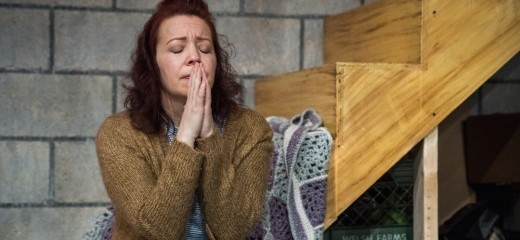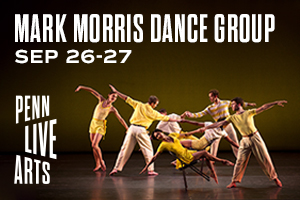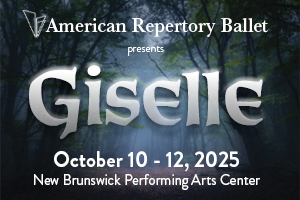
Gunderson’s Natural Shocks: Lifting the Lid on Violence in America
by Mieke D
Theatre Philadelphia and thINKingDANCE continue our partnership, begun in 2018, bringing coverage and new perspectives to Philadelphia’s vibrant theatre scene.
Natural Shocks takes an unexpected look at gun control—connecting mass shootings and domestic violence in a dizzying display of linguistic sleight of hand by Lauren Gunderson, America’s most-produced playwright.
Despite the explicit content warnings posted throughout the lobby of the Drake’s Louis Bluver Theatre—there will be talk of domestic abuse, there will be strobe lights—I still didn’t see it coming.
The set of Simpatico Theatre’s production of Natural Shocks (directed by Elise D'Avella and designed by Marie Laster) is seductively innocuous. The stage looks like every suburban basement, complete with messy Christmas decorations, tiny window, and nowhere to sit but a pile of boxes under a rickety staircase. Amanda Schoonover descends said staircase as Angela, a Hamlet-quoting insurance agent waiting out a tornado, to deliver the play’s verbally acrobatic soliloquy.
Schoonover skips around Gunderson’s rhetorical maelstrom with ease and dexterity. She reels us in with quirky relatability—tiptoeing around in socks, flicking her wrists and pointing her toes—while rhapsodizing about statistics, actuary science, and re-insurance. Schoonover infuses these weighty topics with romance, humor, and drama under D’Avella’s astute direction. Even as Angela strains to keep her audience entertained with her bubbly exterior, playfully readjusting herself every time she’s about to tell a joke or do an impression, she seems jumpy and anxious.
True to the form of a soliloquy, Angela sees and then addresses the audience right away, yet it remains unclear how this logic fits in with other aspects of the play. The realistic set, the familiar circumstances, and Schoonover’s down-home delivery signal naturalism (where the audience is invited to peer in on a representation of life from behind an invisible “fourth wall”). And yet Angela’s awareness of the audience makes it feel more like cabaret or stand-up, where audience interaction is usually encouraged. The multiple theatrical styles make it hard to get comfortable, but eventually serve up a Trojan horse worth waiting for.
For much of the play, Angela talks to the audience about topics that seem connected to the potentially dire situation at hand. When she strays off topic—to talk about a dog she doesn’t have, Hamlet’s “to be or not to be” speech, or the gun in her closet—it is at times endearing and at other times jarring. What persists is the sense that Angela is talking around something, working through a puzzle that we do not yet understand. When she finally reveals a desire to leave her husband, this clear inner conflict comes as a relief.
The new-found certainty, however, quickly unravels as Angela says, “I lied.” Out comes a series of corrections that reframe Angela’s entire soliloquy, situation, and personhood. Angela is having an affair with a woman in her field. “I lied,” she says again, this time about her husband, who turns out to be abusive, despite her earlier reassurances. “I lied,” she says again, bringing these two facts ever more into the present moment. Just before the play began, she came clean, inciting her husband’s murderous rage. The tornado forced her to seek safety underground rather than out the door, and here we all are: Angela and her audience, awaiting a tornado and the return of a man with a gun who wants to kill her.
Lights flicker, ceiling crumbles, the tornado rocks the set and a knock comes booming from the door.
Ever the statistician, even under duress, Angela explains that “domestic abuse victims are 5% more likely to die when guns are in the house.” Angela explains that this entire monologue has been preamble to a fatal instance of domestic violence and a subsequent mass shooting. The statistics, of which she is one, continue: “While domestic abuse accounts for nearly 10% of all gun deaths, 58% percent of all mass shooters have a history of domestic abuse.” In an instant, the play links intimate partner abuse and domestic terrorism as interconnected social problems. Gunderson’s play reveals that, in this fictional story and in many true stories, these social issues are jointly caused by a culture that normalizes private violence, patriarchy, and easy access to guns. To the audience, her only judge and witness, moments before she is to die and her husband is to commit mass murder, Angela cries, ”I was the signal that nobody saw.” And the basement door opens.
Natural Shocks, Simpatico Theatre, Louis Bluver Theatre at The Drake, Dec. 4 - 22.
For more information on the connections between intimate partner violence and mass shootings, please watch Democracy Now, “How Domestic Violence and Militarism ‘Open the Floodgates’ to Mass Shootings Like the Texas Massacre,” November 7, 2017.
By Mieke D
January 8, 2020







